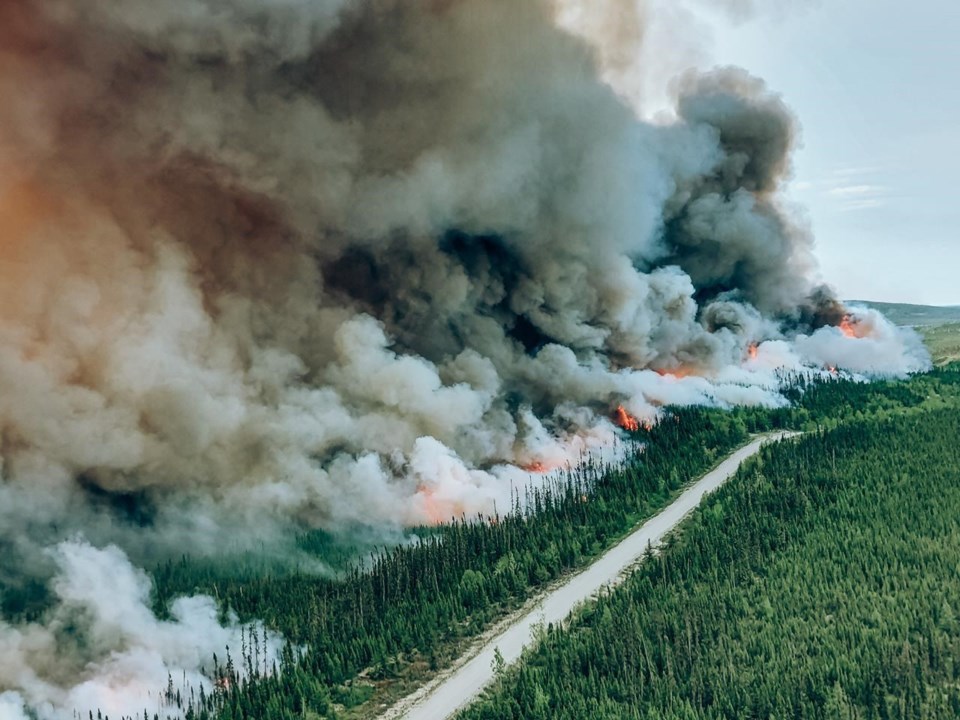MONTREAL — Wildfires in northern Quebec continue to rage despite recent rainfall, and the coming days will bring a risk of lightning, which could spark more fires if strikes hit dry ground, Environment and Climate Change Canada says.
The rain that fell earlier this week was insufficient to put out the fires, meteorologist Steven Flisfeder told reporters Wednesday. And a forecast model suggested fire hot spots were unlikely to receive the more significant precipitation expected farther south over the next few days, he added.
"There has been a bit of help from the rain for those battling forest fires, but unfortunately those fires continue," Flisfeder said. Areas most affected by fires received between 15 and 40 millimetres of rain between Sunday and Wednesday, with possibly higher amounts in localized areas.
Meanwhile, wildfire smoke led the federal weather agency this week to issue special air quality statements for all of southern Ontario and much of western Quebec. The meteorologists said they expected air quality in the Montreal area to worsen as that smoke moved into the city by Wednesday evening.
Quebec's forest fire prevention agency reported 110 active fires Wednesday afternoon, including 73 in the southern half of the province. It has said that lightning is the cause of the majority of fires in the province this year.
Several communities in northern and western Quebec were still under evacuation orders due to fires and smoke, though residents of the town of Lebel-sur-Quévillon and the Cree community of Mistissini will be able to return home this week, officials have announced. Mistissini lifted its evacuation order Tuesday evening.
Lebel-sur-Quévillon Mayor Guy Lafrenière said Wednesday that recent temperatures and a favourable weather outlook for July made it possible for the community to begin a gradual return after their second evacuation in a month. Members of the general public are scheduled to begin coming back starting Saturday, he said.
However, fires still pose a threat to the town, the mayor said, adding that a third evacuation is still possible.
"There is a risk of fires coming back in full force in July," he warned. "However, we think it would be unrealistic to wait until all of these fires are under control because we'd still be evacuated for four to six weeks."
Almost 1,200 vulnerable people from Cree communities, including Mistissini, are among the evacuees.
Dr. François Prévost of the Cree Board of Health and Social Services of James Bay said the evacuation process has gone relatively well, but he added that the situation poses particular health, logistical and cultural challenges for evacuees — including elders, medical patients, pregnant women and infants — who have been transferred across hotels and health-care facilities in Montreal, Trois-Rivières, Quebec City and Saguenay.
He likened the evacuation to "going camping without prior notice," uprooting people from their homes and lands.
The resulting separation of families has taken a mental health toll in a community that places high value on familial bonding, said Virginia Wabano, who is co-ordinating evacuee services from a hotel in Beaupré, Que., a town about 40 kilometres east of Quebec City.
"Family is very important to us," she explained. "When we go through a crisis, families want to be together. But sometimes there are processes and protocols that hinder that. And then it creates a lot of social issues."
The displacement, she added, has deprived community members of some of the traditional foods that make up their regular diet. There's also concern among evacuees that fires could destroy traditional camps and trap lines.
Prévost said he worries about not only the potential adverse health effects from the evacuations — which in some cases have been weeks long — but also the mental health and social impacts that could linger after evacuees return home.
"Being evacuated is one thing. Returning home is another thing," he said, describing the evacuees as climate refugees. "It's a heavy situation."
This report by The Canadian Press was first published June 28, 2023.
— With files from Marie-Ève Martel in Montreal.
---
This story was produced with the financial assistance of the Meta and Canadian Press News Fellowship.
Thomas MacDonald, The Canadian Press



